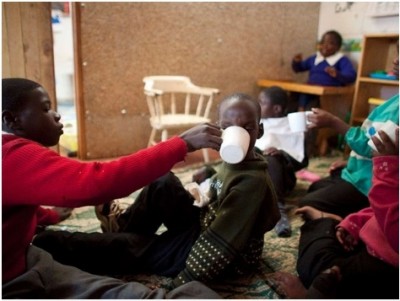Myth on why the rich don’t treat disabled kids
http://www.the-star.co.ke/news/2017/08/07/myth-on-why-the-rich-dont-treat-disabled-kids_c1611198
Erickson Kibet has cerebral palsy and is fed porridge by a classmate at the Little Rock Inclusive Early Childhood Development Centre in Kenya's capital Nairobi, March 15, 2012. Little Rock is one of the few schools providing education to children with special needs in the sprawlling Kibera slums. While hosting regular classes, the centre also has programs for children with cerebral palsy, autism, Down syndrome, deaf and blind children. Picture taken March 15, 2012. REUTERS/Samantha Sais (KENYA - Tags: HEALTH EDUCATION SOCIETY)
Many disabled children from well-off families at the Coast do not get treatment or special care because of a myth that their condition protects wealth, researchers from the Kenya Medical Research Institute say.
Yet, most of these children suffer from neurological disorders that cause drooling.
“Drooling by a person with a disability is sometimes related to the perceived wealth of a parent, often the father,” they say in a study, which was published in the peer-reviewed open access scientific journal published by the Public Library of Science (Plos One) last week.
Drooling (dripping of saliva) can be caused by neurological disorders such as cerebral palsy, down syndrome and autism among others, which can be managed.
In the past, myths on disability were associated with poor, uneducated people. But researchers said both rich and poor families tend to view many of those disabled children as “sources of wealth”.
Kemri’s Joseph Gona said they are described as having been “placed under or on a seat” for demons or ghosts.
“The child just sits with saliva dripping; he-she is in a terrible condition while the father has a lot of money,” said one of the respondents in the research conducted in Kilifi County early this year.
The study was part of a project to promote disability awareness in small communities, and is titled “Preparation of Communities: Using personal narratives to affect attitudes to disability in Kilifi, Kenya.”.
Researchers collected information through 21 focus group discussions involving 263 participants.
On a positive note, they said medical explanations for disability are beginning to emerge, with increasing numbers of families seeking medical advice for children.
Lead researcher Dr Karen Bunning, from University of East Anglia’s School of Health Sciences, which collaborated in the research, said, “The different explanations represent a real mixture of traditional, religious and biomedical beliefs.”



